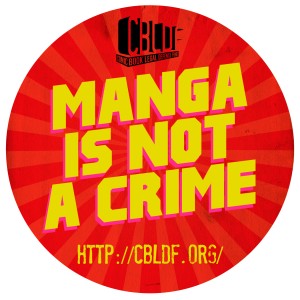Things aren’t going so well for graphic novel and manga publishing. In March of 2011, the Comic Book Legal Defense Fund issued an advisory about transporting comics and graphic novels across international borders. Two months later a comics fan named Tom Neeley was detained at the Canadian border, and his copy of the comic anthology Black Eye confiscated by customs. CBR reported then that Canadian censorship seemed particularly aimed at Japanese comics and gay-themed material.
Last week Comics Alliance reported that criminal charges of child pornography possession had been dropped against U.S. citizen Ryan Matheson, who, in 2010, “entered Ottawa on vacation with a laptop that contained comics images that Matheson described as ‘anime illustrations from art books’ and ‘drawings of fictional anime and manga characters.'”
Hey, it’s not as if having art and fiction labeled as pornography is anything new to fandom, but usually, in the U.S. at least, sense prevails and no one gets thrown in jail. Fortunately, sense finally prevailed with the Canadian government, but only after Matheson served jail time, wracked up $75,000 in legal fees, and finally copped a plea to a “non-regulatory offense” in order to avoid a trial.
Matheson’s narrow escape, however, is by no means a precedent for similar cases in the future. In Australia, for example, child pornography laws encompass everything “from photographs of very young children…to drawings of, and written texts about, an adult who ‘appears to be under 18 years’ in ‘a sexual context.'” And that’s just one facet of obscenity laws that can be used to rule on everything from ‘abhorrent fantasies’ to depictions of consensual sexual activities between adults.
You might think that given relatively lenient U.S. obscenity law, U.S. publishers would take a more lax approach as well; but Amazon is one publisher that seems to be having problems with the whole concept of ‘fiction =/= reality.’ Last May, we reported that Amazon was yanking yaoi from the Kindle, mainly targeting queer erotica. Maybe this is some kind of spring obscenity purging ritual, because it just happened again. This time, Amazon attempted to ban publisher Digital Manga Inc. completely from publishing on the Kindle. In case you hadn’t guessed from the name, this is a publisher that only publishes e-books. Why did Digital Manga incur the banhammer? Apparently it’s due to an extremely vague “content violation” related to nebulous guidelines about pornography that not even Digital Manga understands:
There is no definition of “pornography” versus “erotica” officially available from amazon. In the past, we considered our titles the latter, and strive to comply with Amazon’s guidelines. However, with such vague guidelines and a veritable library of erotica in written and drawn form already available on the Kindle, it is difficult to discern exactly what rules Amazon wanted us to comply with. We also find it disheartening that our titles depicting male homosexual romance have been banned while erotica depicting other forms of intercourse flourishes. What makes relationships between men more objectionable than erotic tristes between men and women? This is a question we imagine you’re all asking yourselves right now, and a question that we need Amazon to answer for us.
The connections between Amazon banning yaoi from the Kindle and the status of manga and comics in international law are pretty grim. Amazon considers queer-themed material to be more offensive than straight material, and this trend plays right into the hands of countries where border censorship is already heavily aimed at queer lit. The harder it is for yaoi fans to access yaoi through mainstream publishers, the more difficult it will be to legitimize the status of yaoi specifically and manga in general. If huge publishers like Amazon broadly censor manga because they generalize it as “pornography,” the more likely many countries will be to follow suit. And that may lead to more experiences like Matheson’s, and the 2006 ordeal of manga fan Elizabeth McClung, who was “surrounded by six officers, two watching me as the four others went page by page through my books looking for pornographic images and other evidence I was a sexual predator.”
Both of these stories thankfully have a happy ending: Ryan Matheson avoided a prison sentence, and Digital Manga fans protested so loudly that Amazon reinstated the publisher’s catalogue. While this is a lucky thing for DM, Amazon now has a proven track record of censoring yaoi that doesn’t bode well for the future. Fanficforensics notes that “if [Amazon] can be swayed by one group of people yelling loudly about their interpretation of the vague content guidelines, they can be swayed by other groups, including those whose interpretations are not so benign and who may want to stop others’ voices from being heard on Amazon’s massive platform.”
The more popular international comics become, the more fans need to vocalize that manga and queer-themed fiction are valid forms of literature, just as they did in Digital Manga’s case. But we also have to be cognizant and careful about the fact that, depending on where we are on the planet, those same valid forms of literature could send us to jail.
Aja Romano blogs regularly at Bookshop.








Published: Mar 26, 2012 12:30 pm